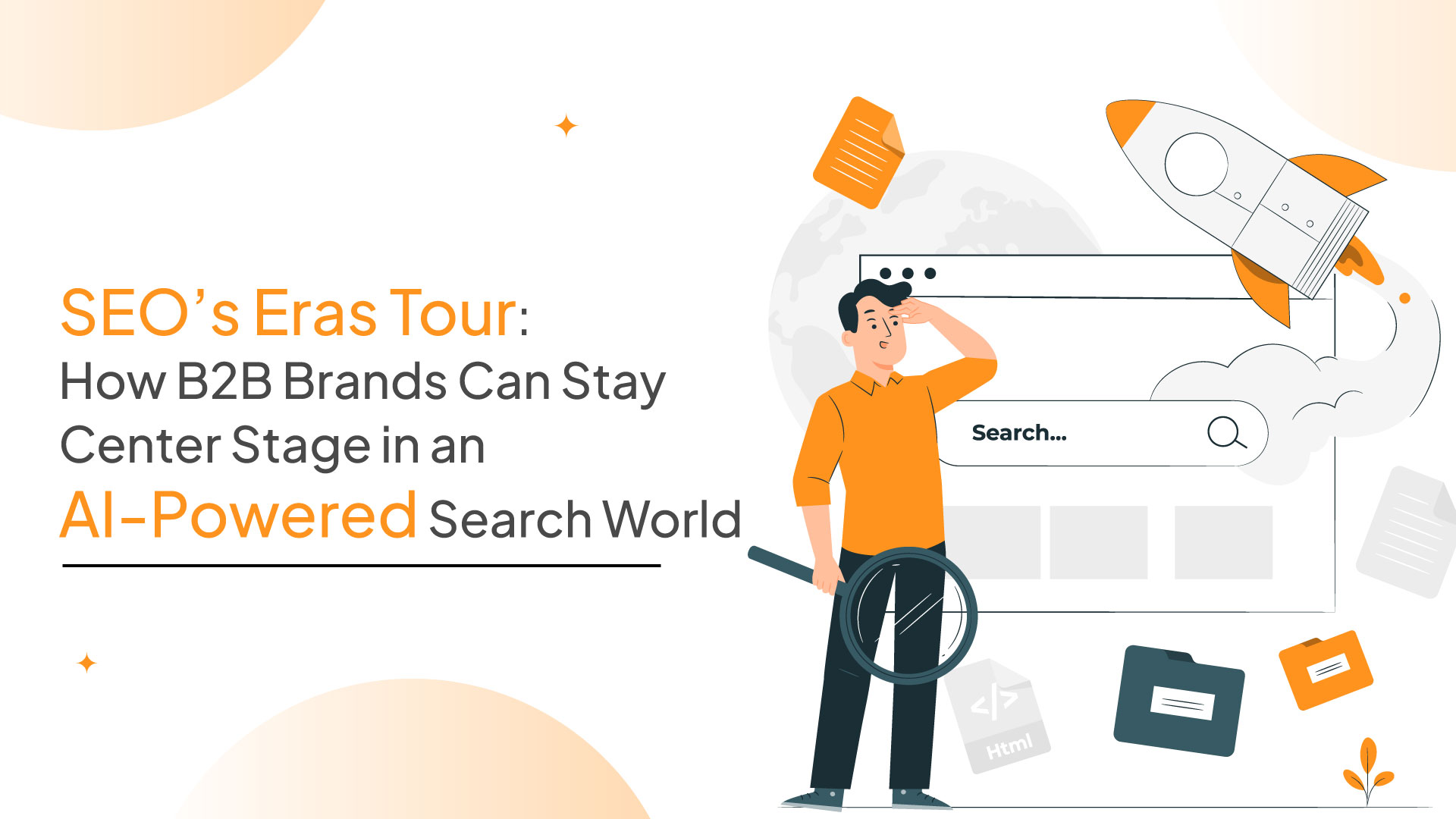

b2b data marketing
SEO’s Eras Tour: How B2B Brands Can Win in the AI-Powered Search World
SEO’s Eras Tour: How B2B Brands Can Win in the AI-Powered Search World
Not long ago, showing up first on Google felt like hitting the jackpot. But the rules of search have changed dramatically. A convergence of trends is altering how buyers find and evaluate companies. Today, your clients might never see your site, let alone click on it.
For B2B marketers, that’s not a minor shift. It’s a complete rewrite.
Search has entered its “Eras Tour” phase. Think of it like Taylor Swift’s career evolution. Early SEO was the “Teardrops on My Guitar” era: simple and keyword driven. Now, it’s The Eras Tour: bold, complex, and everywhere at once.
For B2B firms, where long sales cycles and trust drive growth, traditional SEO is no longer the headliner. It’s one act in a production starring Large Language Models (LLMs), zero-click behavior, and AI-powered content delivery. Visibility now depends on whether your content can be cited and trusted, often before a prospect even starts searching.
Relevance Over Riffs: Why Trust Is the New Keyword
The SEO shift began in 2015 with Google’s first AI algorithm, RankBrain. From then on, it moved away from keyword stuffing and toward intent. Later came mobile-first indexing, featured snippets, and the E-A-T (Expertise, Authority, and Trust) framework.
Now we’re in the E-E-A-T era, where Experience joins the mix. LLMs like ChatGPT and Gemini don’t just crawl pages; they parse meaning and cite trusted sources, often skipping traditional results altogether.
In this new world, B2B companies must create credible, experience-driven content to compete.
Your Website Isn’t Center Stage Anymore
If you needed a reason for teardrops on your guitar, it’s AI-native platforms acting as research assistants for your buyers. Today, your buyers are getting all the information they need directly from AI summaries and citations with the requirement to click through to your website. That makes things easier for users, but harder for marketers.
Tools like Claude and Perplexity prioritize trustworthy, structured sources. If your content isn’t optimized for clarity and credibility, it won’t get surfaced. Ranking in the top 10 on Google matters less when AI tools bypass traditional SERP entirely.
SEO Isn’t Dead. It’s Just Gone Platinum.
Let’s dispel the myth: SEO isn’t obsolete, it’s evolving. Think less cassette tape, more Spotify playlist. The fundamentals remain, but the format has changed.
Modern SEO must:
- Focus on topics, not just keywords
- Build semantic relationships AI understands
- Showcase expertise via author bios and credible backlinks
- Optimize for AI summaries, not just search engine results pages (SERPs)
It’s not about gaming the system. It’s about proving your content belongs in the conversation.
No Clicks, No Problem—If You’re on AI’s Playlist
Here’s the wake-up call: nearly 60% of U.S. Google searches end in zero clicks. Users are finding answers in snippets, summaries, or AI responses.
Clicks are no longer the ultimate goal; visibility is. Your brand needs to be found, cited, and trusted even when there’s no click involved.
Winning in an AI-Powered Search World
To stay visible and drive action, B2B marketers must rethink their strategy. Here’s how:
1. Strengthen Your EEAT Strategies
- Highlight real people behind your content. Use bylines and bios that reflect lived experience.
- Showcase expertise with deep, specific content. Include credentials and link to LinkedIn profiles.
- Build authority by earning coverage in reputable publications and platforms.
- Establish trust with secure websites, responsive support, and transparent policies.
2. Enhance Your Zero-Click Search Optimization
- Use tools like AlsoAsked.com to find real buyer questions.
- Answer those questions directly in your content briefly and clearly.
- Use bullet points, short paragraphs, and Q&A formats to improve snippet quality.
3. View Brand-Building as a Search Optimization Strategy
- Boost your presence across media outlets, podcasts, LinkedIn, and webinars.
- Encourage brand mentions, even without links, as they influence AI credibility scores.
- Think of these mentions as SEO’s new form of word-of-mouth.
4. Enhance Semantic Search Relationships
- Use topic clusters with pillar pages and related sub-pages.
- Include entities recognized by knowledge graphs like Crunchbase and Wikidata.
- Uses internal links with descriptive anchor text to reinforce content relationships.
5. Improve Your Tech Trustworthiness
- Prioritize mobile-first design and fast site speed.
Clean up code and avoid excessive pop-ups.
- Use structured data (JSON-LD via Schema.org) so AI can properly interpret your content.
Search Isn’t a Funnel Anymore—It’s a Remix
Today’s B2B buyers don’t follow a linear path. They explore via YouTube, Reddit, podcasts, LinkedIn, and AI tools often without visiting your site. If your content isn’t visible across that journey, you're invisible.
In this new remix, credibility, clarity, and consistency determine visibility. If you show up as a trustworthy expert, AI will reward you. If not, you're background noise.
So, ask yourself: Is your brand headlining the search remix or stuck in the nostalgia set?
Jane Woodling is Associate Marketing Director and Kelly Meyer is Senior Digital Marketing Manager at Marketri, a tech-forward fractional marketing agency helping B2B brands build smarter visibility in the age of AI.
Get in touch with our MarTech Experts.

Jane Woodling & Kelly Meyer




